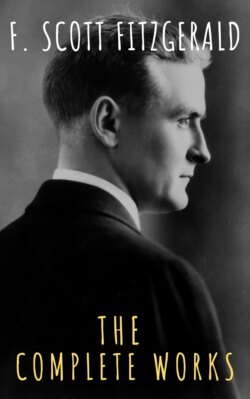Читать книгу The Complete Works of F. Scott Fitzgerald - F. Scott Fitzgerald, The griffin classics - Страница 45
A Damp Symbolic Interlude.
ОглавлениеThe night mist fell. From the moon it rolled, clustered about the spires and towers, and then settled below them, so that the dreaming peaks were still in lofty aspiration toward the sky. Figures that dotted the day like ants now brushed along as shadowy ghosts, in and out of the foreground. The Gothic halls and cloisters were infinitely more mysterious as they loomed suddenly out of the darkness, outlined each by myriad faint squares of yellow light. Indefinitely from somewhere a bell boomed the quarter-hour, and Amory, pausing by the sun-dial, stretched himself out full length on the damp grass. The cool bathed his eyes and slowed the flight of time—time that had crept so insidiously through the lazy April afternoons, seemed so intangible in the long spring twilights. Evening after evening the senior singing had drifted over the campus in melancholy beauty, and through the shell of his undergraduate consciousness had broken a deep and reverent devotion to the gray walls and Gothic peaks and all they symbolized as warehouses of dead ages.
The tower that in view of his window sprang upward, grew into a spire, yearning higher until its uppermost tip was half invisible against the morning skies, gave him the first sense of the transiency and unimportance of the campus figures except as holders of the apostolic succession. He liked knowing that Gothic architecture, with its upward trend, was peculiarly appropriate to universities, and the idea became personal to him. The silent stretches of green, the quiet halls with an occasional late-burning scholastic light held his imagination in a strong grasp, and the chastity of the spire became a symbol of this perception.
“Damn it all,” he whispered aloud, wetting his hands in the damp and running them through his hair. “Next year I work!” Yet he knew that where now the spirit of spires and towers made him dreamily acquiescent, it would then overawe him. Where now he realized only his own inconsequence, effort would make him aware of his own impotency and insufficiency.
The college dreamed on—awake. He felt a nervous excitement that might have been the very throb of its slow heart. It was a stream where he was to throw a stone whose faint ripple would be vanishing almost as it left his hand. As yet he had given nothing, he had taken nothing.
A belated freshman, his oilskin slicker rasping loudly, slushed along the soft path. A voice from somewhere called the inevitable formula, “Stick out your head!” below an unseen window. A hundred little sounds of the current drifting on under the fog pressed in finally on his consciousness.
“Oh, God!” he cried suddenly, and started at the sound of his voice in the stillness. The rain dripped on. A minute longer he lay without moving, his hands clinched. Then he sprang to his feet and gave his clothes a tentative pat.
“I’m very damn wet!” he said aloud to the sun-dial.
